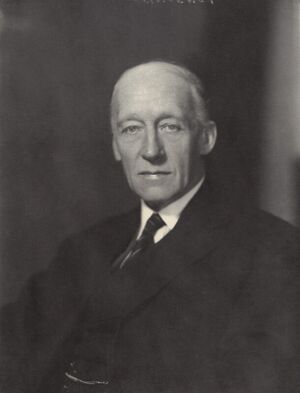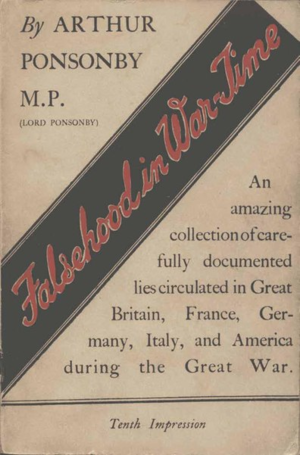Difference between revisions of "Arthur Ponsonsby"
(unstub) |
m (tidy) |
||
| Line 21: | Line 21: | ||
|employment={{job | |employment={{job | ||
|title=Chancellor of the Duchy of Lancaster | |title=Chancellor of the Duchy of Lancaster | ||
| − | |start=13 | + | |start=13 March 1931 |
|end=25 August 1931 | |end=25 August 1931 | ||
}}{{job | }}{{job | ||
|title=Member of Parliament for Sheffield Brightside | |title=Member of Parliament for Sheffield Brightside | ||
| − | |start=15 November | + | |start=15 November 1922 |
|end=1930 | |end=1930 | ||
}}{{job | }}{{job | ||
Latest revision as of 02:33, 19 November 2022
(politician, pacifist) | |||||||||||||||||||||
|---|---|---|---|---|---|---|---|---|---|---|---|---|---|---|---|---|---|---|---|---|---|
 | |||||||||||||||||||||
| Born | 16 February 1871 | ||||||||||||||||||||
| Died | 23 March 1946 (Age 75) | ||||||||||||||||||||
| Nationality | British | ||||||||||||||||||||
| Alma mater | Eton College, Balliol College (Oxford) | ||||||||||||||||||||
| Parents | • Henry Ponsonby • Mary Bulteel | ||||||||||||||||||||
| Children | Elizabeth Ponsonsby | ||||||||||||||||||||
| Exposed | propaganda | ||||||||||||||||||||
British politician, writer, and social activist. His 1928 book Falsehood in War-time, Containing an Assortment of Lies Circulated Throughout the Nations During the Great War, listed and refuted pieces of propaganda used by the Allied Forces during World War 1.
| |||||||||||||||||||||
Arthur Augustus William Harry Ponsonby, 1st Baron Ponsonby of Shulbrede, was a British politician, writer, and social activist. His 1928 book Falsehood in War-time, Containing an Assortment of Lies Circulated Throughout the Nations During the Great War, listed and refuted pieces of propaganda used by the Allied Forces during World War 1.
Contents
Education and early career
He was the son of Sir Henry Ponsonby, Private Secretary to Queen Victoria and Mary Elizabeth Bulteel, daughter of John Crocker Bulteel. He was also the great-grandson of The 3rd Earl of Bessborough, The 3rd Earl of Bathurst and The 2nd Earl Grey. The 1st Baron Sysonby was his elder brother.
Ponsonby was a Page of Honour to Queen Victoria from 1882 to 1887. From an Anglo-Irish family, he was educated at Eton College. While at Eton, Ponsonby was whipped for organising a steeplechase in his dormitory.[1]
Ponsonby studied at Balliol College, Oxford, before joining the Diplomatic Service and taking assignments in Constantinople and Copenhagen.
Career
Ponsonby was a member of the Liberal Party, for which he was elected to the House of Commons in 1908. In 1914, Ponsonby founded the Union of Democratic Control (UDC) with others. The aim of this group was to push back the supposed military influence on the British government and to work for peace. The UDC was particularly opposed to censorship and the introduction of conscription in place of the UK's voluntary system.
After the end of the First World War, Ponsonby joined the Labor Party (which he left in 1940) and was a member of the House of Commons again from 1922. In 1924, Ramsay MacDonald appointed Ponsonby as Parliamentary Under-Secretary of State for Foreign Affairs, and he later was Under-Secretary of State for Dominion Affairs and then Parliamentary Secretary to the Ministry of Transport in 1929.
After being made a peer in 1930, he was for a time Chancellor of the Duchy of Lancaster the following year, and then leader of the Labour Party in the House of Lords from 1931 until 1935, resigning because he was opposed to the party's support for sanctions against Italy for its invasion of Abyssinia.[2]
He was chairman of War Resisters International from 1934 to 1937.
On the outbreak of the Second World War Ponsonby virtually withdrew from active politics. He resigned from the Labour Party on 15th May 1940 as he opposed to its decision to join the National Government formed by Winston Churchill. Ponsonby suffered an incapacitating stroke in September 1943 from which he never recovered.
Falsehood in War-time
Falsehood in War-time identifies the role propaganda played in World War I, in general and specific terms and lists more than 20 falsehoods that were circulated during the First World War. Ponsonby regarded these falsehoods as a fundamental part of the way the war effort was created and sustained, stating that without lies there would be "no reason and no will for war".[3]
In detail, Ponsonby analyses the case of the invasion of Belgium as a cause of the war, the claim of Germany's sole responsibility, the myth of a nurse mutilated by German soldiers, the depiction of the German Emperor as a criminal, the case of a Belgian baby whose hands were cut off, the Leuven altarpiece which had allegedly been destroyed by Germans, the baby of Courbeck Loo, the crucified Canadian soldier, the German Corpse Factory, the German U-boat outrage, the case of the sinking of the Lusitania, atrocity stories reported on German Army troops which were reported killing and maiming of innocent civilians and captured soldiers, faked photographs, the doctoring of official documents, and the "hypocritical" indignation.
As to the Song of the Germans, base for the later German national anthem of the Weimar Republic (since 1922): "Deutschland über Alles auf der ganzen Welt" (Germany above everything in the whole world), Ponsonby said it was popularly accepted as meaning, "[Let] Germany [rule] over every country in the whole world," i.e. the German domination of the world. However, German grammar distinguishes between über Alles (i.e. more important than everything else) and über alle, meaning "on top of everybody."[4] According to Ponsonby, the latter misleading translation was chosen by the Allies during both World Wars for propaganda purposes.
The basic principles of War Propaganda
Anne Morelli systematised the essential propaganda techniques of Ponsonby's work in her book The basic principles of War Propaganda. Morelli explains how these principles not only worked during the First World War, but were also applied in wars into 2001.[5]
- We do not want war.
- The opposite party alone is guilty of war.
- The enemy is inherently evil and resembles the devil.
- We defend a noble cause, not our own interests.(Just war theory)
- The enemy commits atrocities on purpose; our mishaps are involuntary.
- The enemy uses forbidden weapons.
- We suffer small losses, those of the enemy are enormous.
- Recognized artists and intellectuals back our cause.
- Our cause is sacred.
- All who doubt our propaganda are traitors.[6][7]
References
- ↑ https://api.parliament.uk/historic-hansard/lords/1932/jul/07/lords-amendment-1
- ↑ https://www.spartacus-educational.com/TUponsonby.htm
- ↑ Ponsonby, Arthur (1928). Falsehood in War Time: Containing an Assortment of Lies Circulated Throughout the Nations During the Great War. George Allen and Unwin, London.
- ↑ Ponsonby, Arthur (1928). Falsehood in War Time: Containing an Assortment of Lies Circulated Throughout the Nations During the Great War (Chapter 11). George Allen and Unwin, London.
- ↑ Morelli, Anne (2001). Principes élémentaires de propagande de guerre. Brussels: éditions Labor. p. 93.
- ↑ https://web.archive.org/web/20100829172455/http://www.zalea.org/ancien/ungi/communication/propamorelli.html
- ↑ https://archive.org/details/16FalsehoodInWartime
